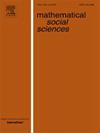Election methods and political polarization
IF 0.5
4区 经济学
Q4 ECONOMICS
引用次数: 0
Abstract
Political polarization poses a significant challenge to democratic societies. While much of the scholarly focus has been on the socio-demographic factors that drive polarization, this paper focuses on voting rules and their effects on the incentives for candidates to be moderate or polarizing. It addresses the question: Which voting methods most impede the success of a polarizing candidate? Through a comparative analysis of plurality voting, the Condorcet method, and Borda’s rule, we find the Borda rule to be the most effective at discouraging extreme platforms. In a generalization, we show that a scoring rule is more effective at hindering the success of polarizing candidates the more weight that it places on voters’ second preferences in the tallying process.
选举方法和政治两极分化
政治两极分化对民主社会构成重大挑战。虽然许多学者关注的是推动两极分化的社会人口因素,但本文关注的是投票规则及其对候选人温和或两极分化的激励的影响。它解决了这样一个问题:哪种投票方式最能阻碍两极分化的候选人取得成功?通过对多数投票、孔多塞方法和博尔达规则的比较分析,我们发现博尔达规则在抑制极端平台方面是最有效的。总的来说,我们表明,评分规则在计票过程中对选民的第二偏好给予的权重越大,就越能有效地阻碍分化候选人的成功。
本文章由计算机程序翻译,如有差异,请以英文原文为准。
求助全文
约1分钟内获得全文
求助全文
来源期刊

Mathematical Social Sciences
数学-数学跨学科应用
CiteScore
1.30
自引率
0.00%
发文量
55
审稿时长
59 days
期刊介绍:
The international, interdisciplinary journal Mathematical Social Sciences publishes original research articles, survey papers, short notes and book reviews. The journal emphasizes the unity of mathematical modelling in economics, psychology, political sciences, sociology and other social sciences.
Topics of particular interest include the fundamental aspects of choice, information, and preferences (decision science) and of interaction (game theory and economic theory), the measurement of utility, welfare and inequality, the formal theories of justice and implementation, voting rules, cooperative games, fair division, cost allocation, bargaining, matching, social networks, and evolutionary and other dynamics models.
Papers published by the journal are mathematically rigorous but no bounds, from above or from below, limits their technical level. All mathematical techniques may be used. The articles should be self-contained and readable by social scientists trained in mathematics.
 求助内容:
求助内容: 应助结果提醒方式:
应助结果提醒方式:


